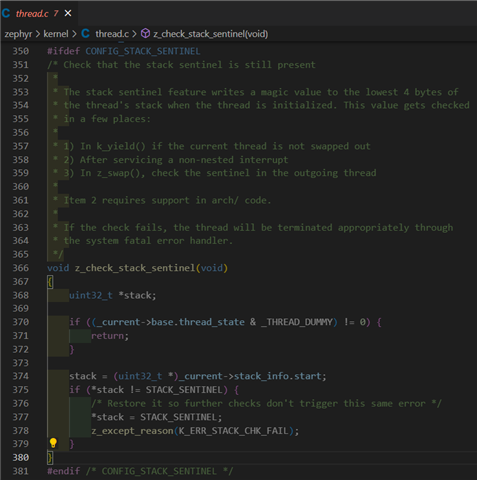Hello,
I am having an issue with Zephyr, it constantly reboots the system because of stack overflow.
00> [00:05:36.447,265] <err> os: r0/a1: 0x00000002 r1/a2: 0x20004d60 r2/a3: 0xf0f0f0f0 00> [00:05:36.447,296] <err> os: r3/a4: 0x2000e700 r12/ip: 0x2000a5e4 r14/lr: 0x00058045[0m 00> [00:05:36.447,326] <err> os: xpsr: 0x41070000 00> [00:05:36.447,326] <err> os: r4/v1: 0x00000000 r5/v2: 0xffffffff r6/v3: 0xffffffff 00> [00:05:36.447,357] <err> os: r7/v4: 0x00000000 r8/v5: 0x00000001 r9/v6: 0x00000000 00> [00:05:36.447,357] <err> os: r10/v7: 0x00000001 r11/v8: 0x20001a00 psp: 0x20026d28 00> [00:05:36.447,357] <err> os: EXC_RETURN: 0x0 00> [00:05:36.447,387] <err> os: Faulting instruction address (r15/pc): 0x00046704 00> [00:05:36.447,418] <err> os: >>> ZEPHYR FATAL ERROR 2: Stack overflow on CPU 0 00> [00:05:36.447,418] <err> os: Current thread: 0x20004d60 (logging) 00> [00:05:36.780,670] <err> fatal_error: Resetting system .... [03:04:16.903,503] <err> os: r0/a1: 0x00000002 r1/a2: 0xe000ed04 r2/a3: 0xf0f0f0f0 00> [03:04:16.903,533] <err> os: r3/a4: 0x2000e700 r12/ip: 0x00000000 r14/lr: 0x0003235d 00> [03:04:16.903,533] <err> os: xpsr: 0x410f0021 00> [03:04:16.903,564] <err> os: r4/v1: 0x20003890 r5/v2: 0x0005a3a3 r6/v3: 0x00000007 00> [03:04:16.903,564] <err> os: r7/v4: 0x000000c6 r8/v5: 0x20003888 r9/v6: 0x00030f79 00> [03:04:16.903,594] <err> os: r10/v7: 0x00058b54 r11/v8: 0x00000000 psp: 0x20026c10 00> [03:04:16.903,594] <err> os: EXC_RETURN: 0x0 00> [03:04:16.903,594] <err> os: Faulting instruction address (r15/pc): 0x00046704 00> [03:04:16.903,625] <err> os: >>> ZEPHYR FATAL ERROR 2: Stack overflow on CPU 0 00> [03:04:16.903,656] <err> os: Fault during interrupt handling 00> 00> [03:04:16.903,656] <err> os: Current thread: 0x20004d60 (logging) 00> [03:04:17.257,568] <err> fatal_error: Resetting system[0m
Sometimes in these faults, it says "Fault during interrupt handling".
The code line for the faulting address is:
arm-none-eabi-addr2line.exe -e build\zephyr\zephyr.elf 0x00046704 ncs/v2.1.0/zephyr/kernel/thread.c:380
It is actually in reference to the SENTINEL mechanism:

I am using the following CONFIG options for logging, and even with absurd values of stack it still fails:
# -- Lora # -- BLE # -- MCUBoot ... # -- Logs CONFIG_UART_CONSOLE=n CONFIG_USE_SEGGER_RTT=y CONFIG_RTT_CONSOLE=y CONFIG_LOG_BACKEND_RTT=y CONFIG_LOG=y CONFIG_LOG_PROCESS_THREAD=y CONFIG_LOG_DEFAULT_LEVEL=4 CONFIG_LOG_BUFFER_SIZE=8192 CONFIG_PRINTK=n CONFIG_LOG_PRINTK=n CONFIG_NEWLIB_LIBC=y CONFIG_CBPRINTF_FULL_INTEGRAL=y CONFIG_CBPRINTF_FP_SUPPORT=y CONFIG_NEWLIB_LIBC_FLOAT_SCANF=y CONFIG_NEWLIB_LIBC_FLOAT_PRINTF=y CONFIG_NEWLIB_LIBC_NANO=n # -- Optimizations CONFIG_NO_OPTIMIZATIONS=n # -- Sentinel and stacks CONFIG_STACK_SENTINEL=y CONFIG_THREAD_STACK_INFO=y CONFIG_THREAD_MONITOR=y CONFIG_INIT_STACKS=y CONFIG_THREAD_NAME=y CONFIG_EXTRA_EXCEPTION_INFO=y CONFIG_GPIO_LOG_LEVEL_DBG=y CONFIG_LORA_LOG_LEVEL_DBG=y CONFIG_BT_RX_STACK_SIZE=4096 CONFIG_IDLE_STACK_SIZE=4096 CONFIG_PRIVILEGED_STACK_SIZE=4096 CONFIG_BT_CTLR_RX_PRIO_STACK_SIZE=1024 CONFIG_BT_HCI_TX_STACK_SIZE=4096 CONFIG_LOG_PROCESS_THREAD_STACK_SIZE=100000 CONFIG_LOG_BUFFER_SIZE=8192 CONFIG_MAIN_STACK_SIZE=4096 CONFIG_ISR_STACK_SIZE=32768 CONFIG_SYSTEM_WORKQUEUE_STACK_SIZE=4096 # -- Heap CONFIG_HEAP_MEM_POOL_SIZE=15240
Is the problem really the logging thread? Any suggestions?
